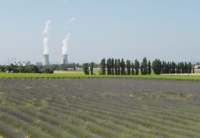A committee appointed by the French government has made 18 recommendations for the country's nuclear industry to improve transparency and information on nuclear safety.
 |
| Tricastin from afar (Image: IRSN) |
The committee submitted the report on the monitoring of groundwater around French nuclear facilities to Borloo on 7 November. Based on tests conducted by various national nuclear safety authorities, the committee concluded that "the state of groundwater under and around nuclear sites generally does not pose any significant environmental or health hazards." It added, "The state of groundwater and surface water around nuclear sites is now generally well known."
However, it said that "radiological markings" were found in groundwater at some old nuclear sites, but these have been monitored for some time. The HCTISN said that contamination at these sites remained below levels recommended by the World Health Organization (WHO).
The work of the committee led to it determining that there is now a "solid legislative foundation" for public information, transparency and consultation with stakeholders. However, it noted that it is difficult for the public to understand the situation at nuclear facilities and former waste storage sites. According to the committee, "There is rich and varied information, often long available, but it is scattered, disparate, compartmentalized and, in some cases, difficult to access."
As a result, the HCTISN makes 18 recommendations to improve information on nuclear safety. It suggests that information should be made more understandable and easier to access by the public, for example by creating an Internet portal. In addition, the provision of information on a local level should be strengthened. The committee also recommends developing the capacity of expertise and independent experts, for example, by using accredited 'independent' laboratories, such as those in universities and environmental protection agencies.
Borloo told Reuters at a news briefing following the submission of the committee's report, "Some of the recommendations on how to improve transparency, information and expertise are very powerful and I commit myself to put in place the 18 proposals."














